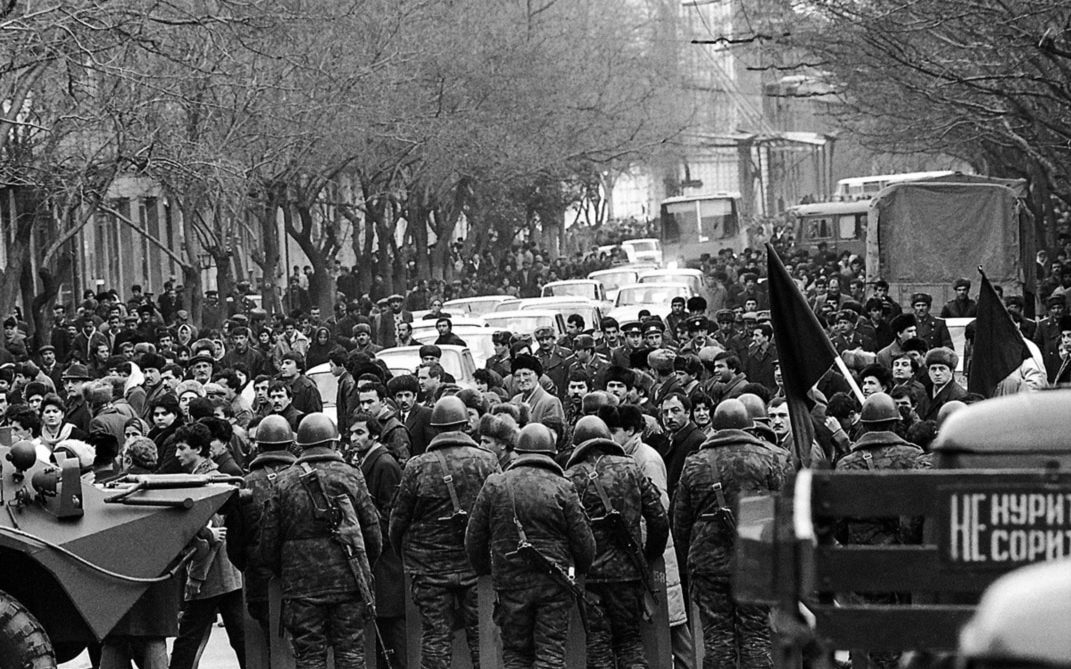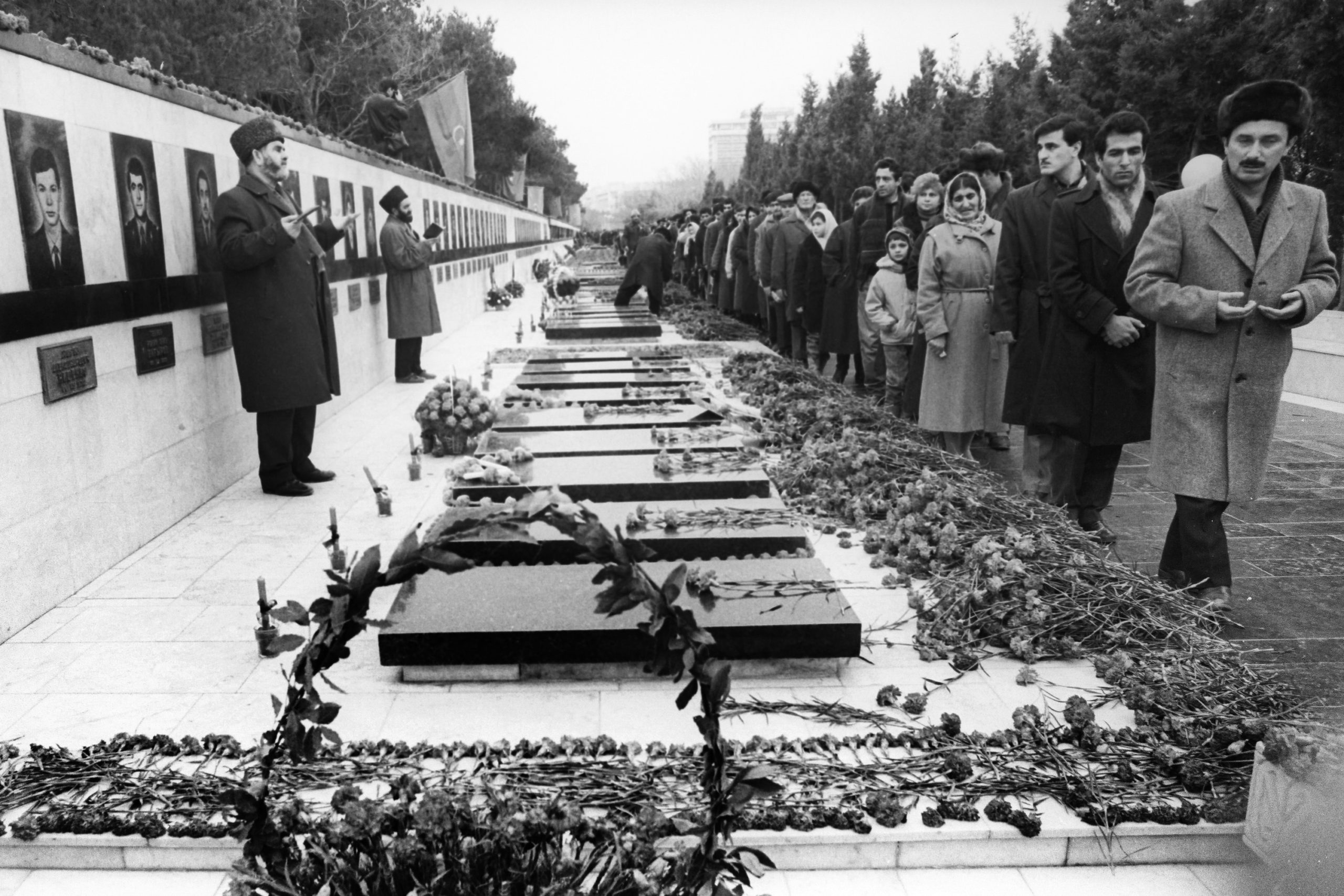20 January 2018 marks the 28th anniversary of the military invasion and brutal killing of civilians in the city of Baku, Azerbaijan by the forces of the former Soviet Army on 20 January 1990. Black January stands for martyrdom and human courage, resistance and denial of aggression which led to restoration of independence of Azerbaijan from 70-year former Soviet rule. It was a victory of precious “human blood” over brutality and barbarism.
Black January reflects sorrow as well as Azerbaijanis ‘strength, struggle and success against all odds. The Soviet leadership ordered some 26000 troops with heavy military equipment to storm the city of Baku in an operation called “Strike” during which humanity bled and the beasts were everywhere but even then, it could not strike down the true spirit of interfaith harmony, patriotism, national pride and communal unity. People having diversity of faith, belief and origin stood fast to fight against huge odds.
Black January also portrays “victory of humanity” over vicious killing, collective determination over indiscriminate cleansing and ultimately Azerbaijanis became victors and the forces of evil and darkness and attackers on democratic norms, civil liberties and free will eventually diminished which showed aptly values of die-hard spirits of economics of humanity.
Martyrs of Black January 1990 are real heroes and sons of the motherland, Azerbaijan who defended the freedom and independence of Azerbaijan with their bravery and became larger than life characters. These Martyrs are still alive in the shape of Azerbaijan’s irrevocable independence, uncompromising sovereignty, sustained socio-economic prosperity and the last but not the least, its unbending national pride.
Subsequently, Azerbaijan declared independence on October 18, 1991. And today the Azerbaijanis are proud of those who were ready to perish for the sake of their people’s national identity, sovereignty, and freedom around the globe. The victims of Black January 1990 were ordinary people fathers, mothers, sons and daughters who were crushed by tanks and hit by bullets. These martyrs were Muslims, Christians, Jews and even Russians who created individual stories of self-sacrifice and the birth of the independence movement. More than 200 innocent people were murdered, more than 700 were seriously wounded and an unlimited number was captured and remained in torture cells.
The Black January massacre, considered the “gateway” event to the independence of Azerbaijan, traces its roots to the Nagorno-Karabakh conflict. Events of Black January were illegal, hostile to democracy and totally contradictory to the principles of human rights and the establishment of a legitimate nation.
The Fall of the Berlin Wall was a great day that opened the door to democracy and human rights across Europe and beyond, similarly Black January became instrumental for the fall of former Soviet Union in Central Asia and South Caucasus. Black January was a turning point for the Azerbaijanis people who abandoned Soviet identity becoming citizens of the independent Republic of Azerbaijan at a time when such independence still seemed unreachable. It also bears witness to the heroism of the common people, a newlywed couple and children shot by soldiers and to bullet-ridden ambulances. It showed height of dutifulness and responsibility on part of doctors, nurses and paramedical staff who died as they protected their patients.
Black January also upholds grief which has enduring human befitting propositions. It united the people of Azerbaijan despite ethnic diversity and strengthened their resolve to achieve that independence. Ultimately, it sustained values of faith, courage, and the strength of human spirits which are universal and everlasting. It was an act of perseverance and the will to move on and move forward with a better life, a life of freedom, fairness, tolerance and peace and it also left an even stronger and even greater impression in daily lives of people to centralization of command to national politics to the regional geopolitics.
Black January carries tragedy too but it transformed the outlook of Azerbaijan after which dreams of a qualitative life, socio-economic prosperity, modernity, and smarter economy became reality and now, the Republic of Azerbaijan holds 75 percent of GDP of South Caucasus.
During an operation ‘Strike‘ which began from the late hours of January 19 into January 20, 26,000 hostile and aggressive-minded Soviet Special Forces called “Alfa” entered Baku to commit atrocities against the Azerbaijani people. They stormed and murdered hundreds of civilians without declaring a state of emergency. The city was under siege with darkness everywhere. Men were arrested, the media was blocked and people were deprived of the right to access information. There was complete chaos. Alfa shot at any moving target, dark alleys and windows of houses. Tanks crushed every object in its ways. But the Azerbaijanis were determined to protect their territorial integrity and did not step back, showing their sacrifice and vigor for the national freedom.

The crime that the Soviet army committed on these two days in Baku was a bloody crime against the Azerbaijanis who were protecting their constitutional rights. It did not break the spirit of the nation, but marked a turning point in the history of Azerbaijan’s independence from the Soviet Union and revealed the strong determination of the people to build their own sovereign country. Despite being subjected to military, political and moral aggression, Azerbaijani national movement succeeded to stand against Soviet challenge, and Soviet troops eventually had to withdraw from Baku. Subsequently Azerbaijan declared its independence on October 18, 1991.
The founding father and former President of Azerbaijan stood against all odds and condemned this attack as a crime against humanity while even living in Moscow at that time. He extended his support to people. A report by Human Rights Watch titled “Black January in Azerbaijan” states: “Indeed the violence used by the Soviet Army on the night of January 19-20 constitutes an exercise in collective punishment. The punishment inflicted on Baku by Soviet soldiers may have been intended as a warning to nationalists, not only in Azerbaijan, but in other Republics of the Soviet Union.” Moscow’s Memorial Human Rights Society and Helsinki Watch denounced Soviet attacks against unarmed civilians and even ambulances. And with time, the world came to know what had happened in Baku.
The people of the Republic of Azerbaijan celebrate January 20 as the Day of Martyrs every year. when the people pay tribute to its martyrs and also commemorate the achievements in the years since as an independent nation, and acknowledge that January 20 1990 for all its bloodshed, was a first and vital step towards Azerbaijan’s freedom. It was a state terrorism and crime against humanity on part of former USSR. It marked the beginning of the end of Soviet rule in Azerbaijan.
January 20, 1990 symbolizes the superiority of human traits over state terrorism. It upholds victory of heroism over horrendous crimes. It projects the purity of self-determination over the power of destruction. It values the importance of sacrifice and courage in order to achieve larger than life goals i.e. independence. Today, Azerbaijan’s freedom is solid and irrevocable which is the blessing of departed souls of January 20, 1990 martyrs. Black January reflects the courageous resolve of Azerbaijanis against aggression, oppression and nationalism to protect their national sovereignty and dignity. It upholds their strong will towards free choice, freedom of expression and association and above all humanity. It shows strong character of its rulers and people alike to stand against naked power and say no to use of power in resolving any conflict.
It once again proves that abuse of power achieves nothing but widespread condemnation, isolation and ultimately disintegration. The same happened to the USSR afterwards. The sacrifices of courageous sons of the soil of Azerbaijan are cherished in the hearts of the people as a beacon of hope and self-determination.




